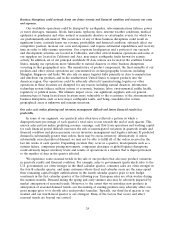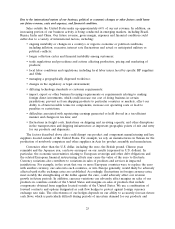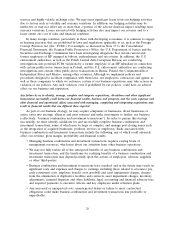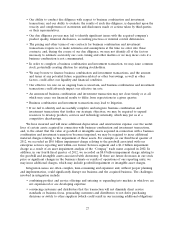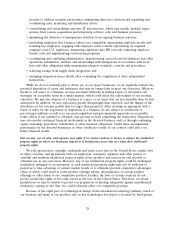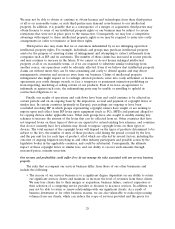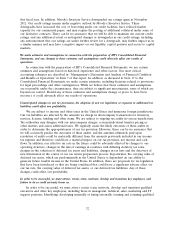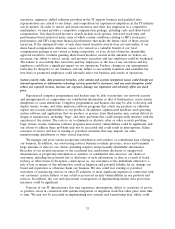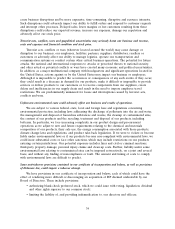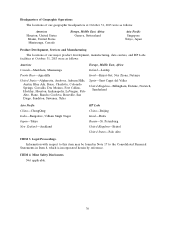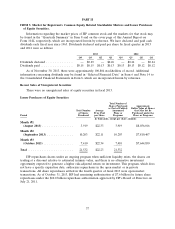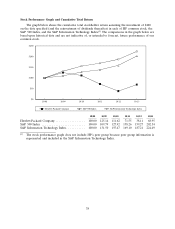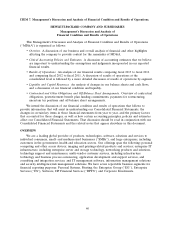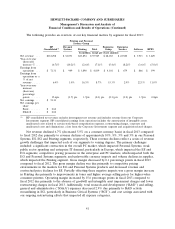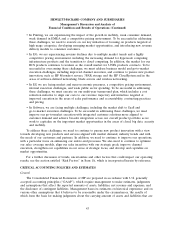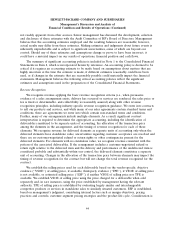HP 2013 Annual Report Download - page 42
Download and view the complete annual report
Please find page 42 of the 2013 HP annual report below. You can navigate through the pages in the report by either clicking on the pages listed below, or by using the keyword search tool below to find specific information within the annual report.cause business disruptions and be more expensive, time-consuming, disruptive and resource intensive.
Such disruptions could adversely impact our ability to fulfill orders and respond to customer requests
and interrupt other processes. Delayed sales, lower margins or lost customers resulting from these
disruptions could reduce our expected revenue, increase our expenses, damage our reputation and
adversely affect our stock price.
Terrorist acts, conflicts, wars and geopolitical uncertainties may seriously harm our business and revenue,
costs and expenses and financial condition and stock price.
Terrorist acts, conflicts or wars (wherever located around the world) may cause damage or
disruption to our business, our employees, facilities, partners, suppliers, distributors, resellers or
customers or adversely affect our ability to manage logistics, operate our transportation and
communication systems or conduct certain other critical business operations. The potential for future
attacks, the national and international responses to attacks or perceived threats to national security,
and other actual or potential conflicts or wars have created many economic and political uncertainties.
In addition, as a major multinational company with headquarters and significant operations located in
the United States, actions against or by the United States may impact our business or employees.
Although it is impossible to predict the occurrences or consequences of any such events, if they occur,
they could result in a decrease in demand for our products, make it difficult or impossible to provide
services or deliver products to our customers or to receive components from our suppliers, create
delays and inefficiencies in our supply chain and result in the need to impose employee travel
restrictions. We are predominantly uninsured for losses and interruptions caused by terrorist acts,
conflicts and wars.
Unforeseen environmental costs could adversely affect our business and results of operations.
We are subject to various federal, state, local and foreign laws and regulations concerning
environmental protection, including laws addressing the discharge of pollutants into the air and water,
the management and disposal of hazardous substances and wastes, the cleanup of contaminated sites,
the content of our products and the recycling, treatment and disposal of our products, including
batteries. In particular, we face increasing complexity in our product design and procurement
operations as we adjust to new and future requirements relating to the chemical and materials
composition of our products, their safe use, the energy consumption associated with those products,
climate change laws and regulations, and product take-back legislation. If we were to violate or become
liable under environmental laws or if our products become non-compliant with environmental laws, we
could incur substantial costs or face other sanctions, which may include restrictions on our products
entering certain jurisdictions. Our potential exposure includes fines and civil or criminal sanctions,
third-party property damage, personal injury claims and clean-up costs. Further, liability under some
environmental laws relating to contaminated sites can be imposed retroactively, on a joint and several
basis, and without any finding of noncompliance or fault. The amount and timing of costs to comply
with environmental laws are difficult to predict.
Some anti-takeover provisions contained in our certificate of incorporation and bylaws, as well as provisions
of Delaware law, could impair a takeover attempt.
We have provisions in our certificate of incorporation and bylaws, each of which could have the
effect of rendering more difficult or discouraging an acquisition of HP deemed undesirable by our
Board of Directors. These include provisions:
• authorizing blank check preferred stock, which we could issue with voting, liquidation, dividend
and other rights superior to our common stock;
• limiting the liability of, and providing indemnification to, our directors and officers;
34


